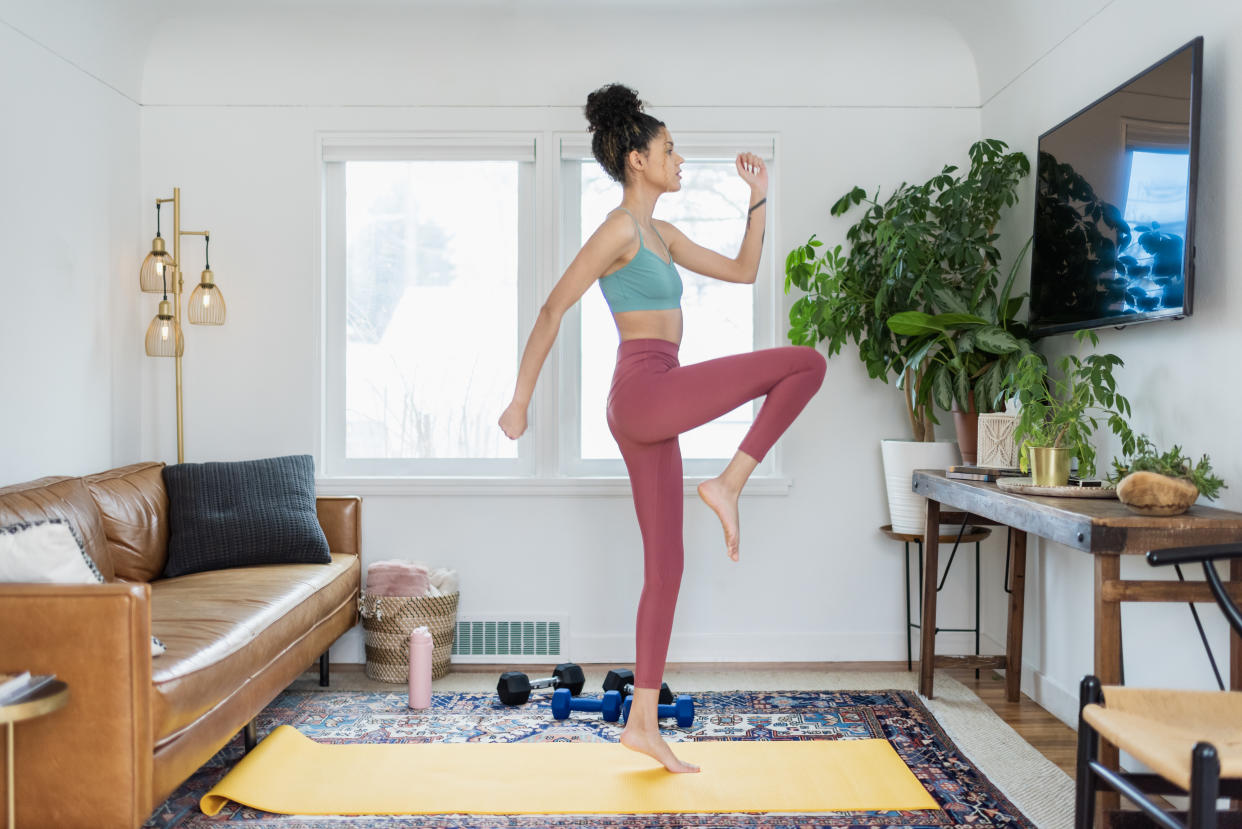Doing quick, easy exercises at night — even while watching TV — can help you sleep better, new study finds

When it comes to getting a good night’s sleep, the standard advice is to wind down and shut off screens an hour before your bedtime. And while sleep experts still recommend this, new research suggests that you may be fine to watch a little TV before bed — provided you also get in some easy exercises while you do it.
That’s the major takeaway from a new study published in BMJ Open Sport & Exercise Medicine. For the study, researchers had participants do two four-hour evening sessions where they either sat during that time or sat and took three-minute activity breaks every half hour.
Those breaks were simple: Participants did chair squats, calf raises and standing knee raises with straight leg hip extensions. The researchers found that the study participants slept for 30 minutes longer after they did these exercise breaks vs. when they just sat for four hours straight.
“These simple, bodyweight exercises were chosen because they don’t require equipment, or a lot of space and you can do them without interrupting the TV show you are watching," Meredith Peddie, primary investigator of the study and a senior lecturer in the department of human nutrition at University of Otago, said in a statement.
Jennifer Gale, lead study author and PhD candidate in the department of human nutrition at the University of Otago, agrees, telling Yahoo Life: “The key thing here is that any break in evening sitting time is better than none." People tend to slow down at night, whether it’s reading, catching up with family or watching TV, and adding in small bursts of exercise helps to break this up and support good sleep, she points out.
About 1 in 3 American adults say they don’t get enough rest at night, according to the National Heart, Lung, and Blood Institute, making this a sleep-supporting hack worth considering.
But why are short periods of exercise in the evening helpful, and how can you put this into practice at home? Here’s what experts say.
How does small bursts of exercise before bed help you sleep?
Conventional wisdom says that exercising before bed will hype you up and make it harder to get to sleep. But some research has shown that doing an activity before going to bed can actually support good sleep.
One meta-analysis published in the journal Sports Medicine analyzed data from 23 studies and found that those who did exercise in the evening seemed to fall asleep faster and spend more time in deep sleep than people who didn’t work out at night. There was a caveat, though: People who did high-intensity exercise, like interval training, less than an hour before bed took longer to fall asleep and ended up having poorer sleep quality.
The latest study didn’t explore why these short exercise breaks helped people get more sleep at night, but there are some theories.
“We know that exercise both increases drive to sleep as well as sleep duration,” Dr. W. Christopher Winter, neurologist and sleep medicine physician with Charlottesville Neurology and Sleep Medicine and host of theSleep Unplugged podcast, tells Yahoo Life.
Exercise can also cause the body to release feel-good chemicals called endorphins, as well as raise your core body temperature — and both signal to your body that it’s time to wake up, Winter points out. However, endorphin levels tend to lower again an hour or two after exercise, while core body temperature starts to fall anywhere from 30 to 90 minutes after exercise, which can make you feel sleepy, he says.
“The key is to find balance and not cross over into the exercise-facilitating wakefulness,” Winter says. He notes that all of the exercises in the latest study focused on the legs and lower extremities, which might be especially helpful for people with restless legs syndrome, a condition that causes a strong urge to move the legs, especially at night. “Many patients with restless legs syndrome experience better sleep when they move and stretch their legs,” he says.
Gale says that more research is needed to figure out why moving a little at night may help support good sleep, which she notes can also help promote better health. “The fact that the exercise resulted in longer sleep is important because too little sleep has been associated with an increased risk of heart disease and diabetes,” she says.
How to put this into practice
Gale says that any movement when you know you’re going to be sitting for a while is important, “ideally [moving] every 30 minutes with two to three minutes of activity.”
Calf raises and squats like the study participants did are helpful, says Gale, but she notes that other exercises could work too. “You could probably get a similar benefit from walking around the house, marching on the spot or dancing in the living room,” she says.
Winter also supports the idea of being active during longer periods of sitting before bed, as long as the activity isn’t too vigorous. “Maybe don’t run marathons before bed, but fearing a little exercise, stretching or yoga before bed probably isn’t helpful either,” he says.
Experts say that adding a little light activity to your evening can’t hurt. But if you’re struggling to sleep, Winter recommends talking to a sleep specialist. “Sleep specialists are everywhere, and it’s always easier to deal with the problem sooner than later,” he says.


